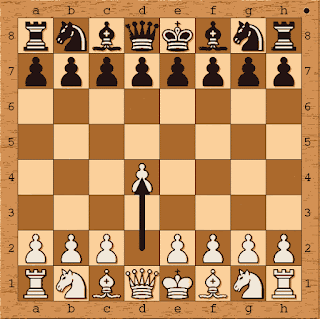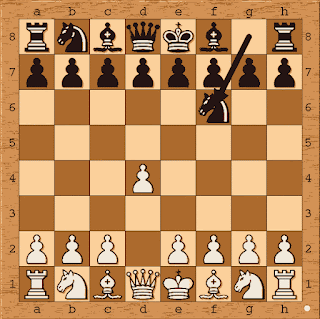1.d4 (A40: Queen Pawn Opening)
- Moving pawn in front of queen is another good way to start playing chess as White.
- By playing 1.d4, White open diagonal c1-h5 for dark squared bishop to move out from back rank and semi open d file for queen.
- Also, it put d pawn on the center of board (the center of board is important area, because many fight with opponent occur on that area).
- By putting Pawn on the center of board, therefore the pawn can support the fight which occur in that area.
- Beside that, by playing 1.d4 the pawn assigned to guard center square (e5 square) and flank square (c5 square).
- By playing 1.d4, the advanced pawn protected by queen while in 1.e4 the advanced pawn unprotected.
Black responses
- Essentially, black trying to gain same advantage like White by moving pawn in front of queen.
- Also, by playing 1...d5 Black trying to discourage White to play 2.e4.
- Because if White insisted playing 2.e4, then Black capture e pawn with 2...dxe4 gaining free pawn.
- The result of 2...dxe4 lead to Blackmar-Diemer Gambit position.
- Blackmar-Diemer Gambit is gambit move, in which White offer free pawn for quick development and attacking chance.
- Blackmar-Diemer Gambit is considered too risky if played in professional level.
- But, it can be used as surprise weapon against unprepared opponent.
1...Nf6 (A45: Indian Defense)
- Black trying to prevent White establishing two pawns at the center of board by guarding e4 square with Knight.
- If White insisted playing 2.e4, then Black capture e pawn with 2...Nxe4 gaining free pawn.
- The result of 2...dxe4 lead to omega gambit.
- In ECO (Encyclopedia of Chess Openings) this move called Queen Pawn Game, but to distinct this move from other move, then we can call it Indian Defense.
- Because Indian Defense is name to describe position starting 1.d4 Nf6.
1...c5 (A43: Old Benoni Defense)
- Black didn't want White to establish pawn in the center, So Black by use c pawn as decoy.
- Decoy is chess tactic which lure opponent pieces into particular square, in order to gain better position.
- By using c pawn as decoy, Black trying to lure White d pawn into c file by playing 2.dxc5.
- If succeeded, then black play 2...e5 to reveal discovered attack by dark squared Bishop against White Pawn (in order to regain material balance).
- Discovered attack is chess tactic which reveal a previously blocked attack by moving by another pieces.
- The result position is better for Black.
1...e5?! (A40: Englund Gambit)
- Black trying to open the center by offering free pawn to white.
- This move considered dubious, so it wise not play this move, even though there is trap and have a chance to regain material balance.
- If White know how to response the trap, then the result of Englund Gambit favorable for White.
- The trap start at 5...Qxb2, the move order leading to Englund Gambit Trap are:
- White logical continuation facing this gambit is to capture e5 pawn by playing 2.dxe5.
- Then Black continuation is playing 2...Nc6 attacking White pawn.
- The logical response for White is to protect the attacked pawn with 3.Nf3.
- Black trying to add pressure to White by combining queen and knight to attack pawn.
- White can choose between attacking the queen (4.Bg5) or protect the pawn (4.Bf4)
- Black check White King by playing 4...Qb4+.
- The logical response is to protect Black King by blocking the attack with Bishop (5.Bd2) while at the same time attack White Queen.
- Black then play 5...Qxb2 regain material balance and threaten to capture Black Rook on a1.
- It very tempting to attack Black Queen by playing 6.Bc3, but this move make White fall for Black trap.
- The correct response to this move is 6.Nc3.
- The continuation after 6.Nc3 favorable for White.





